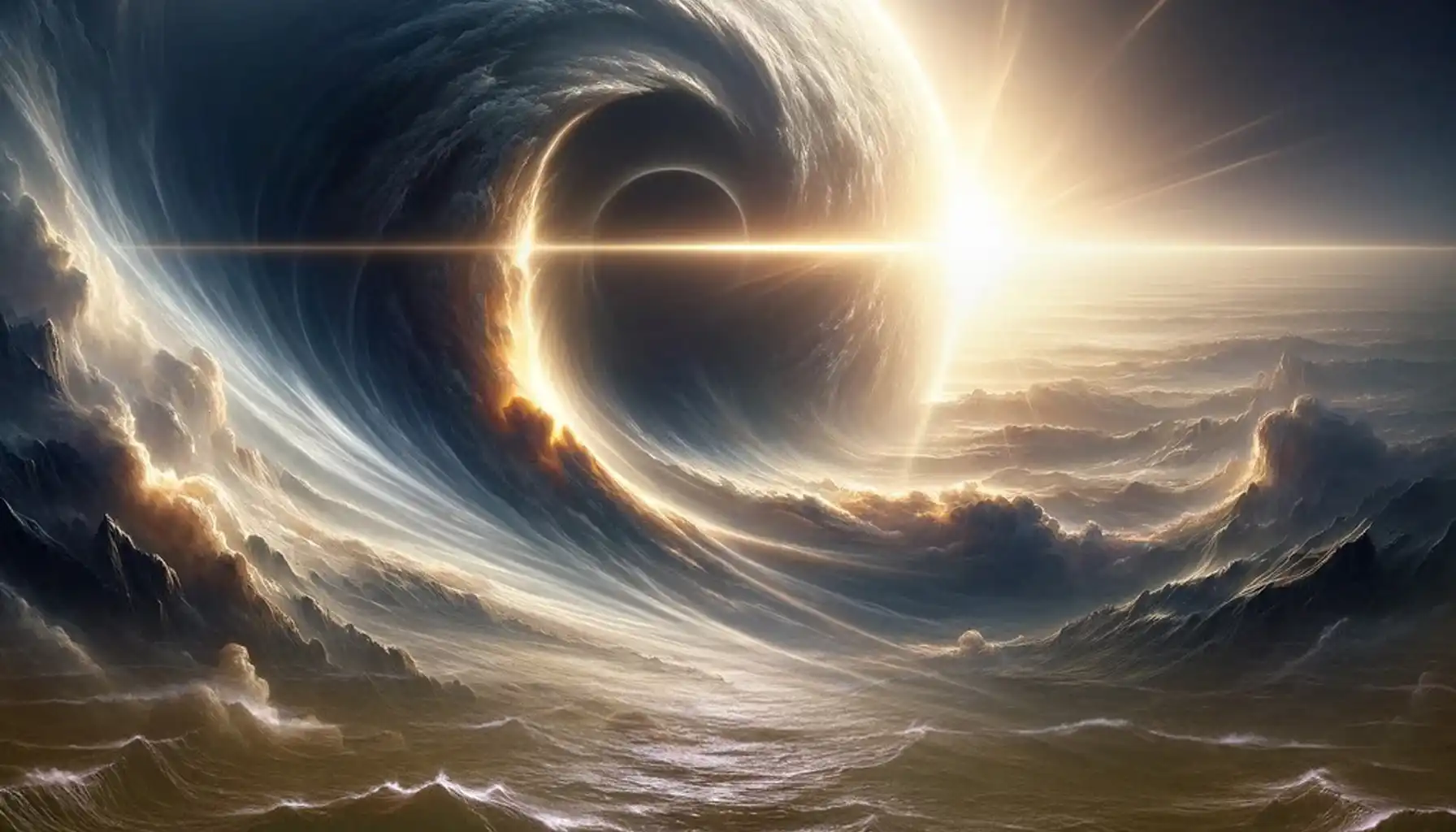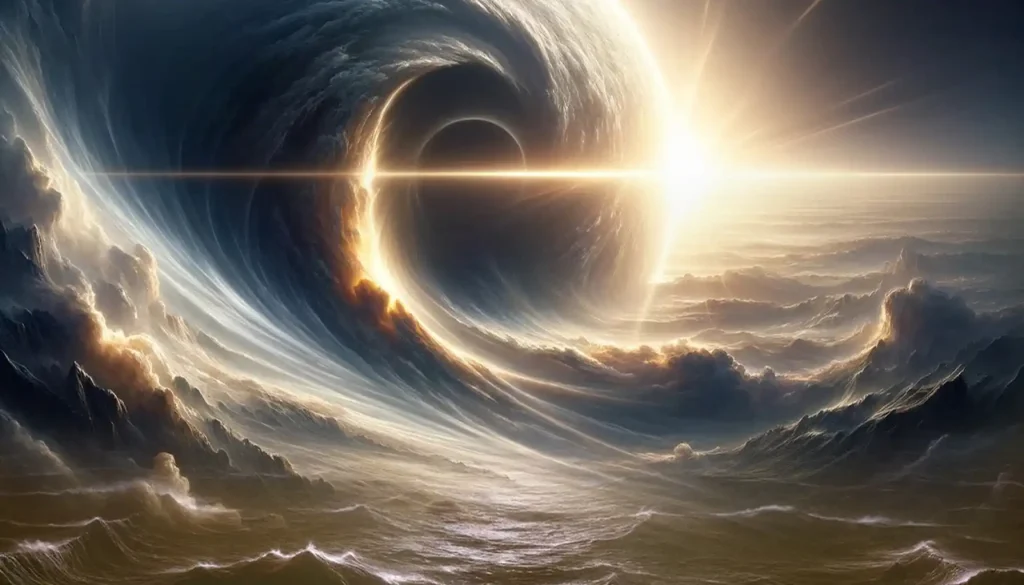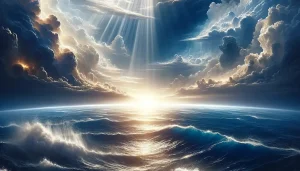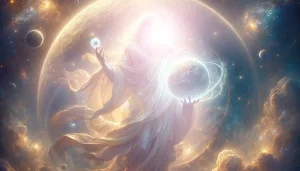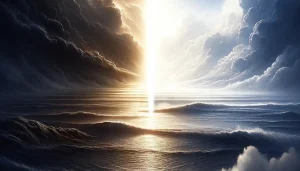And God said, “Let there be light”; and there was light.

וַ Conjunction וְ 50,260x and יֹּ֥אמֶר Verb Qal, consecutive-imperfect, 3rd-person, masculine, singular אָמַר 5,307x to say
And said
אֱלֹהִ֖ים Noun common, masculine, plural אֱלֹהִים 2,600x God, gods, god
God
|
יְהִ֣י Verb Qal, imperfect, 3rd-person, masculine, singular, jussive הָיָה 3,561x to be
let there be
א֑וֹר Noun common, masculine, singular אוֹר 122x light
light
|
וַֽ Conjunction וְ 50,260x and יְהִי Verb Qal, consecutive-imperfect, 3rd-person, masculine, singular הָיָה 3,561x to be ־ Maqaf It connects words or parts of words, similar to an English hyphen.
and there was
אֽוֹר Noun common, masculine, singular אוֹר 122x light
light
׃ Sof pasuq It marks the end of a verse, similar to a period in English.

Language
וַיֹּ֥אמֶר (and said )- Psalm 33:9, “For he spoke, and it came to be; he commanded, and it stood firm.”
אֱלֹהִ֖ים (God )אֱלֹהִים (Elohim) encompasses the concepts of majesty, power, and the supreme deity, unique in His ability to create ex nihilo. It can signify the majestic plural, reflecting the supreme power and dignity of God, or even be seen as a hint towards the complex nature of the Godhead, such as the concept of the Trinity.- Deuteronomy 6:4, “Hear, O Israel: The LORD our God, the LORD is one.”
יְהִ֣י (Let there be )- 2 Corinthians 4:6, “For God, who said, ‘Let light shine out of darkness,’ has shone in our hearts to give the light of the knowledge of the glory of God in the face of Jesus Christ.”
א֑וֹר (light )אוֹר transcends the mere physical phenomenon of light. It often serves as a powerful metaphor for spiritual illumination, wisdom, and the divine presence. In the context of Genesis 1:3, the creation of light serves as the initial act of bringing order to the primordial chaos. It is not just elemental but is also loaded with theological and ethical implications, symbolizing the intrinsic goodness and order that come from God.- Psalm 119:105, “Your word is a lamp to my feet and a light to my path.”
- John 8:12, “Again Jesus spoke to them, saying, ‘I am the light of the world. Whoever follows me will not walk in darkness, but will have the light of life.’
וַֽיְהִי־אֽוֹר (and there was light )- Joshua 10:12-13, “Then Joshua spoke to the LORD in the day when the LORD gave the Amorites over to the sons of Israel, and he said in the sight of Israel, ‘Sun, stand still at Gibeon, and moon, in the Valley of Aijalon.’ And it was so.”
Insights
- God as the Initiator of Creation: Genesis 1:3, “And God said, ‘Let there be light,’ and there was light” demonstrates God’s sovereign initiation in the act of creation. He commands and things come into existence, emphasizing His omnipotence and supreme authority.
- The Power of God’s Word: The phrase “And God said” underscores the immense power of God’s spoken word. Simply by speaking, He brings forth physical reality from nothingness, aligning with the doctrine of Creation Ex Nihilo.
- Divine Intelligence and Intentionality: The methodical nature of creation in Genesis 1:3 indicates a God of intelligence and intentionality. He doesn’t create randomly, but with a structured plan, highlighting His wisdom and purpose.
- The Manifestation of Light: The creation of light as the initial act underscores its significance in the physical world, symbolizing purity, goodness, and the dispelling of darkness. It also foretells the coming of Jesus Christ, the “light of the world” in the New Testament.
- Supremacy Over Chaos: By commanding the light into existence, God brings order to the formless, empty darkness described in Genesis 1:2. This reflects His dominion over chaos, further establishing His sovereign control over all things.
- Setting a Precedent for Redemption: The calling forth of light from darkness prefigures the biblical theme of redemption—God’s continual work of calling His people from the darkness of sin into the light of His presence through Jesus Christ.
- The Trinity in Creation: Though not explicit in this verse, the entire Genesis creation account lays the foundation for understanding the Trinity. The Spirit of God is present, God the Father speaks, and the Word (later revealed as Christ in John 1) creates, alluding to the triune nature of God.
Cross-References
“The infallible rule of interpretation of Scripture is the Scripture itself. Therefore, when there is a question about the true and full meaning of any Scripture (which is not manifold, but one), that meaning must be searched out and ascertained by other places that speak more clearly.” (WCF 1.9)
- 2 Corinthians 4:6, “For God, who said, ‘Let light shine out of darkness,’ has shone in our hearts to give the light of the knowledge of the glory of God in the face of Jesus Christ.”
- This verse mirrors Genesis 1:3, where God commands light into existence, signifying not only the physical light but also the spiritual enlightenment that comes from knowing God through Christ.
- John 8:12, “Again Jesus spoke to them, saying, ‘I am the light of the world. Whoever follows me will not walk in darkness, but will have the light of life.'”
- Jesus’ declaration of being the “light of the world” connects to the creation of light in Genesis 1:3, indicating that He is the source of spiritual light that dispels the darkness of sin.
- Psalm 33:6, “By the word of the LORD the heavens were made, and by the breath of his mouth all their host.”
- This verse in Psalms reinforces Genesis 1:3’s theme of God’s creative power through His word, emphasizing that all creation is the result of God’s divine command.
- Isaiah 45:7, “I form light and create darkness, I make well-being and create calamity, I am the LORD, who does all these things.”
- Isaiah echoes the language of Genesis 1:3, affirming God as the Creator of light and darkness, and hence, the sovereign Ruler over all aspects of existence.
- Revelation 22:5, “And night will be no more. They will need no light of lamp or sun, for the Lord God will be their light, and they will reign forever and ever.”
- Pointing towards the eschatological future, this verse in Revelation reflects back to the initial creation of light in Genesis 1:3, revealing that in the new creation, God Himself will be the unending source of light.
- 1 John 1:5, “This is the message we have heard from him and proclaim to you, that God is light, and in him is no darkness at all.”
- 1 John reiterates the motif of light from Genesis 1:3, symbolically portraying God’s nature as entirely pure, devoid of sin (‘darkness’), and the source of ultimate truth and righteousness.
- Hebrews 1:3, “He is the radiance of the glory of God and the exact imprint of his nature, and he upholds the universe by the word of his power. After making purification for sins, he sat down at the right hand of the Majesty on high.”
- By referring to the Son’s divine power, this verse in Hebrews links to Genesis 1:3, reflecting the creative power of God’s word and the sustaining force of His command in the universe.
Illustrations
